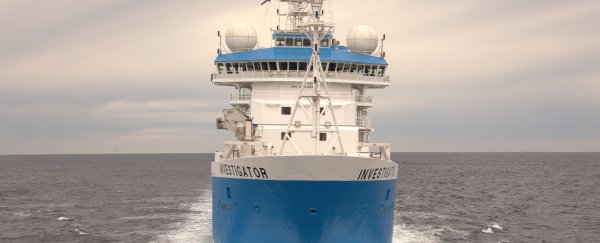The Southern Ocean that surrounds Antarctica has a profound effect on the climate of the Southern Hemisphere. But right now scientists still don't know exactly what those effects are, or how to predict them, as they understand very little about the atmosphere over the ocean.
Now a huge science-filled ship called the Investigator is setting out to change that, with Australia's first permanent ship-bound labs. The on-board scientists will study tiny aerosols in the hopes of creating the best picture so far of the atmosphere over the Southern Ocean.
"Aerosols are tiny particles suspended in the air which cloud and fog droplets cling to - without aerosols, clouds and fog simply cannot form," explained Zoran Ristovski from the Queensland University of Technology (QUT), who helped design and test the laboratory, in a press release.
"Clouds play a big part in climate modelling due to their ability to reflect incoming sunlight back into space… The Southern Ocean is a key driver for Australia's climate and weather - understanding more about the atmosphere in this part of the world will allow us to create far more accurate climate models for this region," he added.
And when they say that fog can't form without aerosols, they mean it, as you can see in the incredible footage below captured by Ristovski in the Arctic in 2008. The video shows that it's pretty much impossible to produce fog in the extremely clean Arctic air - even when you take a boiling hot mug of tea outside in -8 degrees Celsius.
By finding out more about the aerosol concentration above the Southern Ocean, we'll be able to understand more about how it will impact our climate and weather in the future.
"Our politicians depend on accurate climate models to make good decisions about our future," said Robyn Schofield from the University of Melbourne in a press release.
"The unique data sets these laboratories will provide will give the most complete picture of the atmosphere over the Southern Ocean and significantly improve our ability to predict future changes to Australian weather and climate."
The Investigator has already completed its first proof of concept voyage to show that it can perform science in a range of extreme conditions, with researchers from the QUT Institute for Future Environments, the University of Melbourne, CSIRO and the University of Wollongong manning the cold-water trials.
The ship can hold an impressive 40 scientists and travel 60,000 nautical miles (111,000 kilometres) in a single voyage - that's almost three times around the planet. Its on-board Aerosol Laboratory contains specialised equipment to measure even the smallest of particles, less than one nanometre - a billionth of a metre - in diameter. It also contains an Atmospheric Chemistry Laboratory, which will analyse the composition of the atmosphere in detail, including the trace amounts of gasses from human activities.
You can see the specs of the boat in the CSIRO video below. Watch this space for the results of their tests. We can't wait.
Want to study our environment? Find out more about research opportunities at QUT.
Source: QUT
